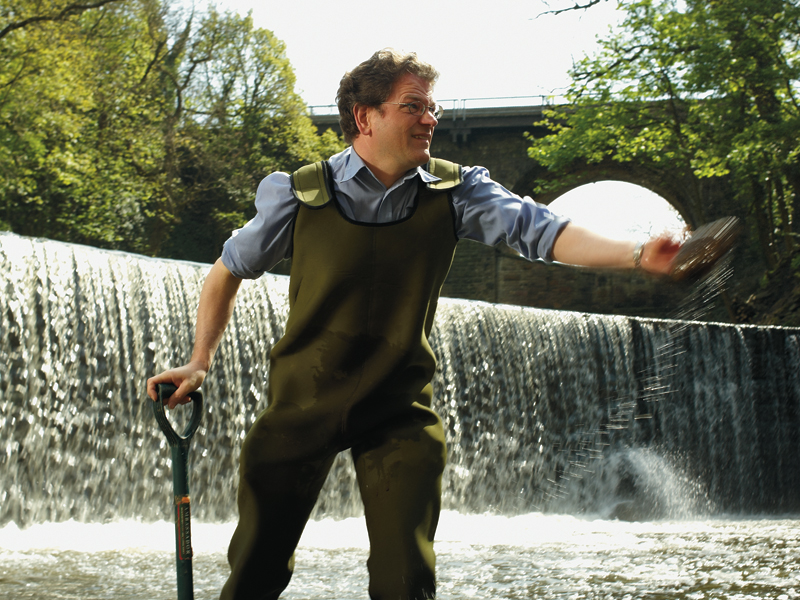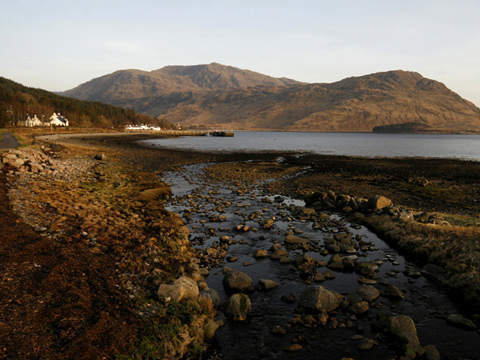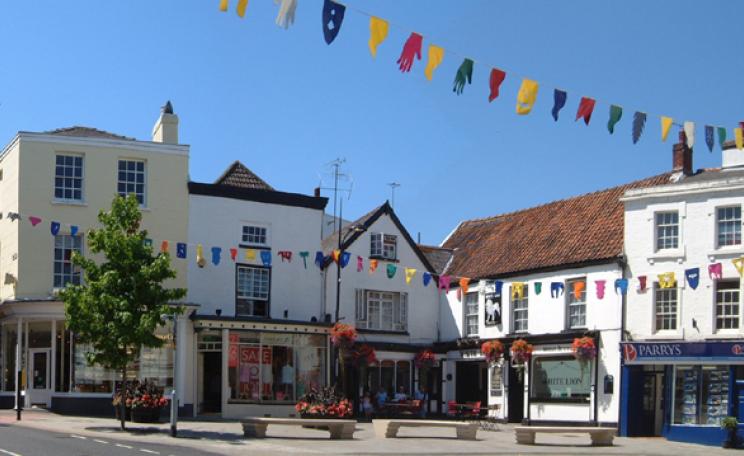Howell and Llinos Williams are Welsh farmers who have kept sheep on the hills at Abercraf, in the Brecon Beacons National Park, for over 40 years. For at least three generations, Howell's family has been farming.
'Back then, they also did some mining - for coal,' says Howell. Today, the Williams extract another kind of energy source from the land - hydroelectric power. 'The best thing is that, unlike coal mining, there's not much work to do,' says Howell. The Williams family is now earning more from selling energy than from their 200 sheep.
The Brecon Beacons National Park, covering over 500 square miles and home to some 32,000 people who live surrounded by flat-topped hills and green valleys, is an ideal landscape for hydroelectricity: abundant rainfall rushes in steep streams to the valley floors. ‘High head' micro hydro schemes have been providing power for half a dozen or so enterprising hill farms for nearly a decade. 'The farmers are growing electricity,' says Gareth Ellis, biodiversity officer in the Brecon Beacons National Park.
As part of a new project initiated by Ellis and his colleague, Grenville Ham, the Williams' farm's carbon footprint is being monitored. The results show that the green electricity generated by the water turbine means that the farm is ‘carbon negative' four times over.
Of course, harnessing the power of water is nothing new. The valleys are full of the remains of old water mills, all of which became redundant once the area was connected to the national grid. It was the potential to return to those days of green power for everyone in the park that led Ellis and Ham to help set up a Community Interest Company (a legal structure for social enterprises developed by the government in 2005) called the Green Valleys with the twin aims of reducing carbon emissions and improving the environment.
The Green Valleys is helping communities to develop community-owned micro hydro schemes by bringing together landowners and local residents and providing access to expertise, grants and loans. Sixty-three schemes are in the pipeline. 'In three years' time we're aiming for 20 per cent of the region's electricity to be from hydro and within 15 years we want all of Brecon Beacons to be carbon negative,' says Ham.
Energy self-sufficiency
With the arrival of feed-in tariffs earlier this month, meaning that small-scale renewable electricity generators will be handsomely rewarded for selling energy to the national grid, the abundant green power will also be generating significant incomes for communities.
'The aim is that communities use hydro schemes as a money multiplier, using the income to, say, pay for photovoltaic cells, insulation and improved public transport,' says Ellis. 'This way people can identify their own needs without going cap-in-hand to the local government to solve their problems.' One community, the villages of Talybont-on-Usk and Pencelli, already has a community-owned energy company, Talybont Energy. Its turbine has been whizzing around generating enough electricity for about 45 homes each year since 2006, producing an annual income of about £30,000.
Talybont Energy has reinvested some of this in a zero-carbon car-sharing club. They have one electric car and one that runs on biodiesel (using fuel made from waste vegetable oil). Participating households book and pay for the vehicles online. There are also electric bicycles, energy audits in villagers' homes and plans for photovoltaic cells on the village hall (where the electric car is charged) and talk of electric cars at B&Bs and the nearest train station, Abergavenny, for tourists to use.
Big Green Challenge
In early 2008, an email from the National Endowment for Science, Technology and the Arts (NESTA) dropped into Gareth Ellis's inbox offering £1 million in prize money to community projects reducing their carbon footprint and improving the environment. With all this activity going on, it wasn't too difficult for Ellis and Ham to build on momentum already started by catalysts such as Talybont Energy and come up with an entry for The Big Green Challenge.
That was when The Green Valleys (TGV) was born. The company went on to become one of three winners of the NESTA prize and is now £300,000 richer.
'What we could do with that money is fund say, six micro hydro schemes, give ourselves a pat on the back and go home, but we're not going to do that,' says Chris Blake, chairman of TGV.
'We're going to use that money carefully and wisely; we need to use it so that it engenders more activity, so that it spreads and grows. We'll leverage it to bring in commercial loan finance,' he says. 'Hydro power is a good way of generating cash: a 16KW scheme that costs £50,000 to install generates £12,000 a year and has a lifetime of 25 years. Most of that cash stays in the community. They're fantastic cash cows,' he adds.
As well as the cash, it is the people in the rural communities that are making a difference, improving their environments and services in many ways. With funds and training from TGV, villagers in places such as Llangatock, have organised volunteer working days - complete with barbecues - eradicating invasive rhododendrons and cutting firewood to bring woodlands back into sustainable management.
Community spirit
Banker-turned-passionate environmentalist Michael Butterfield, who traded in his 4WD Porsche for a 2-stroke bio-diesel car, enthusiastically describes the various projects going on in his canal-side village, which long ago lost its village shop and post office. As well as the woodland management, the community is bulk-buying bio-diesel (from waste vegetable oil), organising litter-picking, has set up 46 allotments and is spending thousands of pounds (which it won in a British Gas ‘Green Streets' award) on reducing the carbon footprint of over 40 homes.
In the longer term, there are plans for a community shop and pub, a dozen or so micro hydro schemes and, in partnership with a large local estate, a 1MW anaerobic digester and biomass burner that will heat all 400 houses in Llangatock. No wonder Butterfield finds himself committing up to 80 hours a week on their community interest company. 'We're here for the next generation and the generation after that,' says Butterfield. 'My lifestyle was contributing to environmental issues on my doorstep and I decided it was time to do something about it.'
The villages of the green valleys in the Brecon Beacons are on a roll and it's the ordinary people who live there - from farmers to former bankers - who are making the changes. 'It isn't just about climate change or carbon reduction; it's about engagement with the community, it's about a sense of belonging and creating wealth in the community,' says Blake.
It's no wonder that the men who started the ball rolling, two local authority officers, Ellis and Ham, joke about the Brecon Beacons National Park one day becoming an independent country.
Further information:
- The Green Valleys website includes information on upcoming events.
- Talybont Energy blog
- Somewhere to stay in the Brecon Beacons (that has its own micro hydro scheme)
| READ MORE... | |
 |
HOW TO MAKE A DIFFERENCE CASE STUDY: setting up a community micro-hydroelectric project The UK’s first community-funded hydroelectric scheme, Torrs Hydro is generating green energy as well as interest in H2O power. Claire Baylis meets the man behind it |
 |
HOW TO MAKE A DIFFERENCE Hydropower TV: learn from the water power pioneers Okay so not much happens most of the time... but for anyone interested in building a hydro-electric turbine these live images of a micro-hydropower project construction in Cumbria make compelling viewing |
 |
NEWS Three Gorges Dam 'a model for disaster' International Rivers has highlighted the environmental damage caused by the world's biggest hydropower project amid concern about plans for two new dams in China |
 |
NEWS ANALYSIS When will we see green jobs in the UK? Will the latest announcement of nine proposals for offshore wind projects and a promised £100bn worth of investment lead to new jobs in the UK or elsewhere? |
 |
INVESTIGATION Learning from remote, sustainable communities Being off the beaten track need not require lashings of fossil fuels to provide a comfortable lifestyle. James Morrison tells the remarkable story of the inhabitants of Scotland's Knoydart Peninsula |








